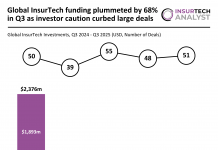Insurance companies looking to neglect their AI development in favour of business stability could see themselves “perish”, according to dacadoo president and CEO Peter Ohnemus.
Many businesses are reassessing their operations and finding how they can cut costs and yet increase output and profits. It would seem impossible, but that is the way to survive the unprecedented challenges of the coronavirus. Halting the development of AI might look like an easy place to make savings, but Ohnemus believes businesses should only do that “if they want to go out of business.”
While this may seem like a strong standpoint, Ohnemus is not alone in this thinking. Microsoft CEO Satya Nadella recently stated things are moving fast with two years’ worth of digital transformation having happened in just two months. There is a clear need for new digital services. A report from B2B software search website Capterra claimed that 51% of small to medium-sized businesses have had to implement new software due to the pandemic. With the pandemic forcing remote workforces and employees being strained during the tough market, AI could be one of the key technologies businesses explore for their digitalisation and relieve some of the stress.
“AI is helping fight the current pandemic,” Ohnemus said. “For instance, a pilot project that is currently taking place in Spain, led by data scientist Nuria Oliver, aims to use AI and to analyse statistics, big data and residents’ mobility in order to monitor the contagion rate of the virus, whilst allowing accurate forecasting of its spread. As many companies and governments equally take on AI as part of the solution for the pandemic (or pandemic-derived issues), we will see rapid changes and further developments in AI in the near future.”
The world has been gradually adopting AI technology and the penetration of the software is expected to skyrocket in just a few years’ time. A KPMG report claims that currently the annual spend on intelligent automation, which includes AI, machine learning and robotic automation, is believed to be around $12.bn, but by 2025 it is estimated to be around $232bn. This huge shift in spending shows AI is expected to be a core aspect of the digital world and companies neglecting its development while the pandemic is around, which could still be another year, might see themselves competing with businesses fully incorporating AI.
“In order to allow stakeholders to steer their own digital experiences firms need to build a solid digital front door and a customer-centric, AI-based digital platform to engage with them in a timely, effective and responsive manner,” he said. The full potential of AI has not been realised yet and there are so many more capabilities it could potentially have in the coming years. But there are still various use cases for the technology, and companies like dacadoo are leveraging the solution to improve workflows, generate better data-driven insights or complete claims with little manual oversight.
The coronavirus could even help to highlight more areas where AI technology could be useful. dacadoo, which is a digital transformation company for the healthcare and Insurtech industries, sees underwriting as one of the areas AI integration could increase following the pandemic. During the peak of the lockdown, face-to-face interactions were largely off the table, but while cases are not as high as they were, well in Europe, these in-person meetings are still avoided unless absolutely necessary. This has forced many companies to move online, but some have just come to a standstill. The trouble is, “Technology won’t wait for insurers to wake up from this five-month nap.”
Instead, companies should be looking at how they can reach the new market. While it might cost money initially, this could be what helps them stay afloat in the long run. One of the areas which could benefit is the underwriting process, with AI being capable of reducing the workloads of staff and improving their accuracy. The customer engagement could also be improved through AI by increasing the interactions they have and offering more personalised experiences to make the customer feel valued, which is crucial in tough times like these.
“At dacadoo, we have developed our Risk Engine to meet the rising need for accelerated underwriting, with confidence and ease. Using our science-based model, which is powered by 300 million person-years of clinical data, Health and Life insurers can calculate mortality and morbidity risks within seconds, even if they only have limited data at hand. This is the kind of approach that provides a tangible solution to accelerated underwriting and dynamic pricing. The Risk Engine also takes away the need for physical consultations, doctor appointments and lengthy sign-up processes, therefore being COVID-19 friendly: it is a win-win for both the insurers and their customers.
“On the other hand, insurers are now facing another prominent obstacle: how to encourage and motivate their customers to stay healthy or even improve their health during a global pandemic. There is a huge market opportunity insurers just cannot miss. By combining AI with gamification principles and behavioural science, the dacadoo Digital Health Engagement Platform poses one of the most efficient solutions. Insurers benefit from implementing our platform for their customers all around the globe; they are finally able to engage with them in an interactive, fun and relevant manner, whilst also being able to reward their efforts to improve their overall health.”
Learn more about dacadoo or download their latest insurance white paper.
Copyright © 2020 FinTech Global










